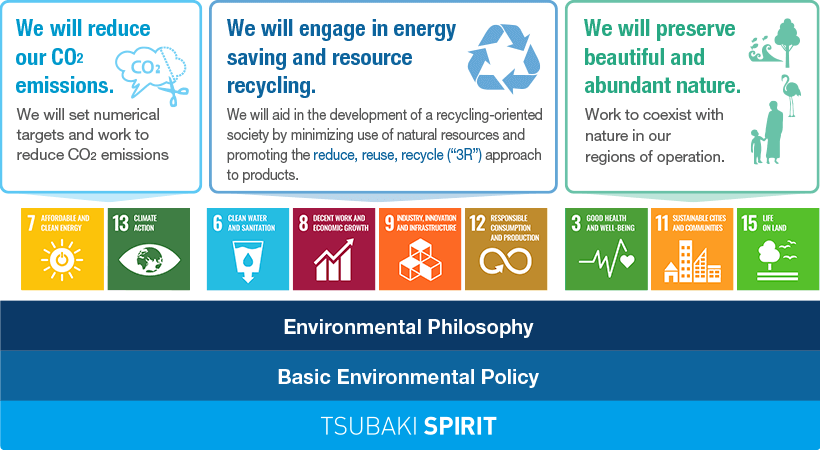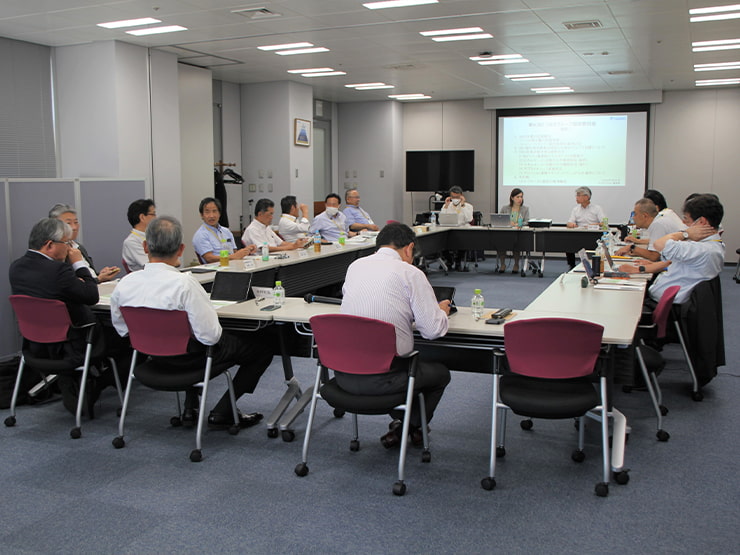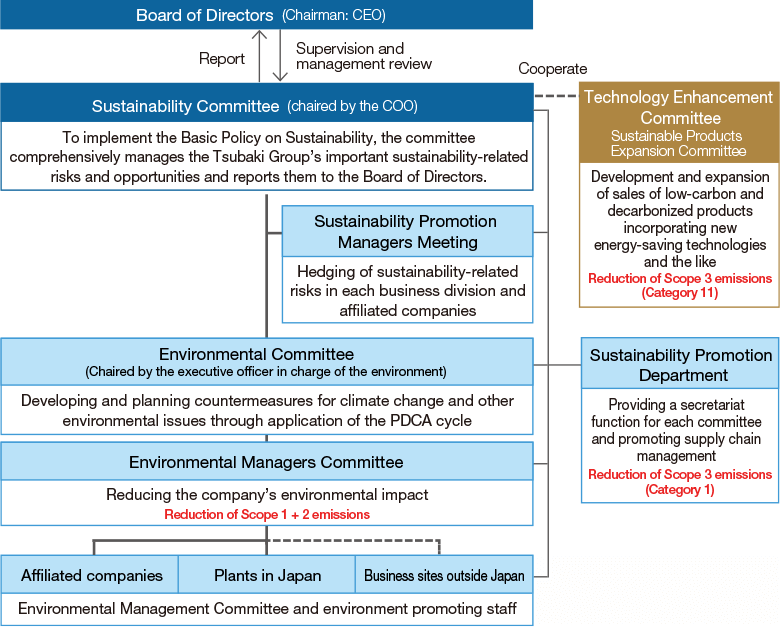Environmental Management
Basic Concept
In order to contribute to the development of a sustainable society, the Tsubaki Group has established the Environmental Philosophy and Environmental Policy and is working to reduce its environmental impact from a medium- to long-term perspective while proactively developing and offering products with high environmental value. In particular, we will address the issue of climate change, which we view as a priority issue of the utmost urgency, by closely monitoring international standards and market and customer trends.
Basic Environmental Policy
Philosophy
The Tsubaki Group recognizes that environmental conservation is one of the most important issues shared by humankind, and seriously considers the environment in all aspects of its global business activities and contributes to the “development of a sustainable society” by generating environmental value and economic value through manufacturing.
Basic Policy
1. Promote environmental conservation
In addition to strictly adhering to the laws and agreements applicable in each region, we will continually improve the environmental management system, committing ourselves with sincerity to the conservation of our global environment.
2. Reducing CO2 emissions
In accordance with the guidelines of the Paris Agreement, we will set an appropriate target for CO2 emissions reduction, and promote activities to reduce emissions.
3. Reduce environmental impact
We will promote the efficient utilization of energy and resources and appropriate management and recycling of wastes and hazardous chemicals, work hard to reduce our environmental impact through the lifecycles of products and services, and realize a recycling-oriented society.
4. Coexist with nature
We will, as a good corporate citizen, work to coexist with nature in our regions of operation, in a manner that respects biodiversity.
5. Develop and spread SDG-oriented products, including eco-products
We will actively develop and spread sustainable products in pursuit of sustainability (of the environment, society, and economy) and aim to achieve both economic benefits and contribution to the environment and society.
6. Promote environmental communication
In addition to promoting sustainability training for employees of the Group, we will proactively disclose appropriate environmental information to our stakeholders to increase the level of trust placed in us by society.
Established: April 2000
Revised: April 2021
Environmental Medium- to Long-term Targets and Activity Policy
Environmental Medium- to Long-term Targets

CO2 Emissions Reduction Targets
| Indicator | Scope | Medium-term Target (FY 2025) | Long-term Target (FY 2030)* | FY 2050 Target |
|---|---|---|---|---|
| Scope 1 + 2 emissions reduction rate |
Domestic | 30% (compared to FY 2013) |
42% (compared to FY 2021) |
Carbon neutrality |
| Outside Japan | 20% or more (compared to FY 2018) |
|||
| Scope 3 emissions reduction rate |
Global | - | 25% in Category 1 and 11 (compared to FY 2021) |
|
| Ratio of renewable energy consumption |
Domestic | 30% or more of electrical power used | Set when formulating the next Mid-term Management Plan is formulated |
100% of power consumption |
* Long-term targets were revised in 2024 following the acquisition of SBT certification in 2023.
Activity Policy for Achieving Goals
Reducing CO2 emissions and promoting resource recycling
1. Energy saving, resource conservation, productivity improvement, introduction of high-efficiency equipment, and introduction and utilization of renewable energy in plant operation
2. Promotion of the EcoFactory Certification System (reducing CO2 emissions, reducing hazardous substances, recycling of waste, efficient use of water, and improving greening rate)
Reducing life cycle CO2 emissions and realizing a recycling-oriented society throughout the supply chain
1. Promotion of green purchasing (weight reduction, compactness, use of new materials, and promotion of the Three R’s)
2. Promotion and expansion of sales of company products and new products with high environmental value
3. In logistics, reduction of CO2 emissions and efficient use of resources
Promotion of environmental activities in local communities
1. Active participation in local environmental activities
2. Coexistence with the local community through the opening of greenery areas, etc.
More information about each activity is provided on the following pages.
Reducing CO2 emissions and promoting resource recycling:
Response to Climate Change Initiatives for a Recycling-Oriented Society and Pollution Prevention Environmental Performance Data
Activities through the supply chain:
Supply Chain Management (Business Partners)
Environmental activities in local communities:
Coexisting with Nature and Conserving Biodiversity Coexisting with Local Communities
Management System

The Tsubaki Group Environmental Committee takes the lead in promoting activities to address environmental issues, including climate change, under the supervision of the Sustainability Committee, which is chaired by the COO.
Under the Tsubaki Group Basic Environmental Policy, the Tsubaki Group Environmental Committee, which is chaired by the executive officer in charge of the environment and comprises general managers of business segments and representatives of Group companies in Japan, addresses the Group’s environmental issues, including climate change, from a medium- to long-term perspective. Furthermore, we assign environmental managers to domestic business sites, and we have established the Environmental Managers Committee as a body for implementing environmental activities. Environmental managers are also assigned to overseas business sites and collaborate with the Sustainability Promotion Department (Group Environmental Secretariat).
System for Promoting the Environment

Scope 1: Direct emissions of greenhouse gases by the business operator itself (fuel combustion, production processes)
Scope 2: Indirect emissions associated with the use of electricity, heat, and steam supplied by other companies
Scope 3: Indirect emissions other than Scope 1 and Scope 2 (emissions of other companies related to the activities of the business operator)
Implementation of the Tsubaki Group Global Environmental Management Manual
Since FY 2023, we have been implementing the Tsubaki Group Global Environmental Management Manual. Based on this manual, each business site undertakes environmental activities unique to the Tsubaki Group. Various environmental data and the status of compliance with environmental laws and regulations are regularly reported to the Sustainability Promotion Department, and this results in improvements to environmental activities throughout the Group, along with the timely disclosure of information.
Environmental Management Systems at Each of Our Business Sites
At our domestic and overseas manufacturing sites, we are implementing environmental protection PDCA in accordance with the EMS (ISO 14001) for each of our sites, and are promoting the Tsubaki Group’s unique environmental improvement activities.
The environmental management system at each business site includes setting environmental policies and targets, evaluating compliance with environmental laws and regulations, identifying risks and opportunities through environmental impact assessments and taking initiatives, conducting internal audits and management reviews, responding to emergencies, and managing communications with stakeholders.
ISO 14001-Certified Business Sites
In 2001, the Tsubaki Group’s Saitama Plant and Hyogo Plant acquired ISO 14001 certification, and all domestic business sites (including those of our Group companies) have since acquired the same certification. Overseas, a total of 19 major subsidiaries and plants have been certified.
List of Tsubaki Group business sites with ISO 14001 registration (0 kB)

